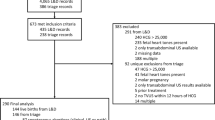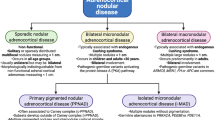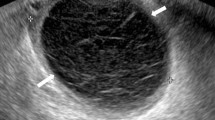Abstract
Cushing’s syndrome during pregnancy is rare, and rather than being of pituitary origin most patients exhibit ACTH-independent adrenal hypercortisolism. In some cases the syndrome has spontaneously resolved post partum, suggesting the presence of a pregnancy-associated stimulatory factor(s). We describe a case with aberrant adrenal LH/hCG receptors in a large adrenal tumor as a possible explanation for cortisol hypersecretion and tumor growth in Cushing’s syndrome during pregnancy. A 27-yr-old woman presented with hypertension and diabetes mellitus in early pregnancy. Investigations revealed hypercortisolemia, suppressed ACTH-levels, and a 6.4-cm right adrenal tumor. The tumor was successfully removed by laparoscopy at 26th week of pregnancy. Hypercortisolism and hypertension resolved post-operatively. The tumor displayed higher LH/hCG receptor mRNA and protein positivity than adjacent normal adrenal tissue as examined by in situ hybridization and immunocytochemistry. High physiological levels of hCG, in conjunction with aberrant adrenal LH/hCG receptor overexpression, may have contributed to the development of Cushing’s syndrome in pregnancy.
Similar content being viewed by others
References
Caticha O, Odell WD, Wilson DE, et al. Estradiol stimulates Cortisol production by adrenal cells in estrogen-dependent primary adrenocorticol nodular dysplasia. J Clin Endocrinol Metab 1993, 77: 494–7.
Lacroix A, Tremblay J, Rousseau G, Bouvier M, Hamet P. Propranolol therapy for ectopic beta-adrenergic receptors in adrenal Cushing’s syndrome. N Engl J Med 1997, 337: 1429–34.
Bertherat J, Contesse V, Louiset E, et al. In vivo and in vitro screening for illegitimate receptors in adrenocorticotrapin-independent macronodular adrenal hyperplasia causing Cushing’s syndrome: identification of two cases of gonadotropin/gastric inhibitory polypeptide-dependent hypercortisolism. J Clin Endocrinol Metab 2005, 90: 1302–10.
Lacroix A, Hamet P, Boutin JM. Leuprolide acetate therapy in luteinizing hormone-dependent Cushing’s syndrome. N Engl J Med 1999, 341: 1577–81.
Feelders RA, Lamberts SW, Hofland LJ, et al. Luteinizing hormone (LH)-responsive Cushing’s syndrome: the demonstration of LH receptor messenger ribonucleic acid in hyperplastic adrenal cells, which respond to chorionic gonadotropin and serotonin agonists in vitro. J Clin Endocrinol Metab 2003, 88: 230–7.
Bovenberg SA, Pieters GF, Hofland LJ, Hermus AR. Leuprolide acetate therapy in LH-dependent Cushing’s syndrome: in vivo and in vitro observations. Neth J Med 2004, 62: 456–8.
Lacroix A, Bolte E, Tremblay J, et al. Gastric inhibitory polypeptide-dependent cortisol hypersecretion — a new cause of Cushing’s syndrome. N Engl J Med 1992, 327: 974–80.
Chabre O, Liakos P, Vivier J, et al. Cushing’s syndrome due to a gastric inhibitory polypeptide-dependent adrenal adenoma: insights into hormonal control of adrenocartical tumorigenesis. J Clin Endocrinol Metab 1998, 83: 3134–43.
Albiger NM, Occhi G, Marinello B, et al. Food-dependent Cushing’s syndrome: from molecular characterization to therapeutical results. Eur J Endocrinol 2007, 157: 771–8.
Reznik Y, Lefebvre H, Rohmer V, et al. Aberrant adrenal sensitivity to multiple ligands in unilateral incidentaloma with subclinical autonomous cortisol hypersecretion: a prospective clinical study. Clin Endocrinol (Oxf) 2004, 61: 311–9.
Aron DC, Schnall AM, Sheeler LR. Cushing’s syndrome and pregnancy. Am J Obstet Gynecol 1990, 162: 244–52.
Kim HG, Lee KH, Je GH, Han MS. A case of Cushing’s syndrome in pregnancy secondary to an adrenal cortical adenoma. J Korean Med Sci 2003, 18: 444–6.
Wy LA, Carlson HE, Kane P, Li X, Lei ZM, Rao CV. Pregnancy-associated Cushing’s syndrome secondary to a luteinizing hormone/human chorionic gonadotropin receptor-positive adrenal carcinoma. Gynecol Endocrinol 2002, 16: 413–7.
Buescher MA, McClamrock HD, Adashi EY. Cushing’s syndrome in pregnancy. Obstet Gynecol 1992, 79: 130–7.
Blanco C, Maqueda E, Rubio JA, Rodriguez A. Cushing’s syndrome during pregnancy secondary to adrenal adenoma: metyrapone treatment and laparoscopic adrenalectomy. J Endocrinol Invest 2006, 29: 164–7.
Wallace C, Toth EL, Lewanczuk RZ, Siminoski K. Pregnancy-induced Cushing’s syndrome in multiple pregnancies. J Clin Endocrinol Metab 1996, 81: 15–21.
Mazzuco T, Chabre O, Feige JJ, Thomas M. Aberrant expression of human luteinizing hormone receptor by adrenocortical cells is sufficient to provoke both hyperplasia and Cushing’s syndrome features. J Clin Endocrinol Metab 2006, 91: 196–203.
Nolten WE, Lindheimer MD, Rueckert PA, Oparil S, Ehrlich EN. Diurnal patterns and regulation of cortisol secretion in pregnancy. J Clin Endocrinol Metab 1980, 51: 466–72.
Larsen P. Williams Textbook of Endocrinology. 10th ed. Pennsylvania: Saunders, 2003.
Hána V, Dokoupilová M, Marek J, Plavka R. Recurrent ACTH-indepentent Cushing’s syndrome in multiple pregnancies and its treatment with metyrapone. Clin Endocrinol (Oxf) 2001, 54: 277–81.
Pabon JE, Li X, Lei ZM, Sanfilippo JS, Yussman MA, Rao CV. Novel presence of luteinizing hormone/chorionic gonadotropin receptors in human adrenal glands. J Clin Endocrinol Metab 1996, 81: 2397–400.
Mircescu H, Jilwan J, N’Diaye N, et al. Are ectopic or abnormal membrane hormone receptos frequently present in adrenal Cushing’s syndrome? J Clin Endocrinol Metab 2000, 85: 3531–6.
Swords FM, Aylwin S, Perry L, et al. The aberrant expression of the gastric inhibitory polypeptide (GIP) receptor in adrenal hyperplasia: does chronic adrenocorticotropin exposure stimulate up-regulation of GIP receptors in Cushing’s disease? J Clin Endocrinol Metab 2005, 90: 3009–16.
Author information
Authors and Affiliations
Corresponding author
Rights and permissions
About this article
Cite this article
Rask, E., Schvarcz, E., Hellman, P. et al. Adrenocorticotropin-independent Cushing’s syndrome in pregnancy related to overexpression of adrenal luteinizing hormone/human chorionic gonadotropin receptors. J Endocrinol Invest 32, 313–316 (2009). https://doi.org/10.1007/BF03345718
Accepted:
Published:
Issue Date:
DOI: https://doi.org/10.1007/BF03345718




